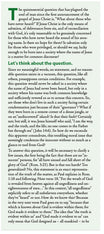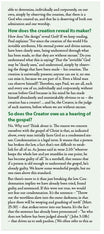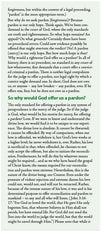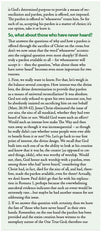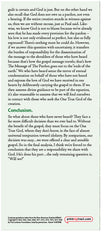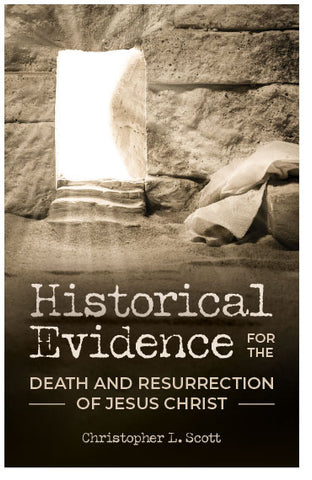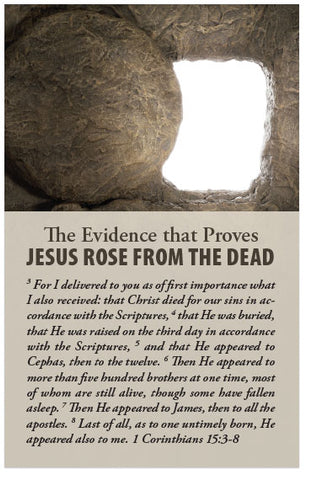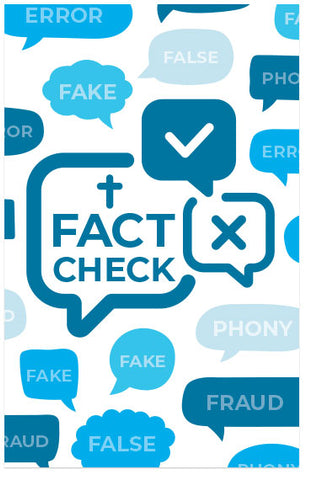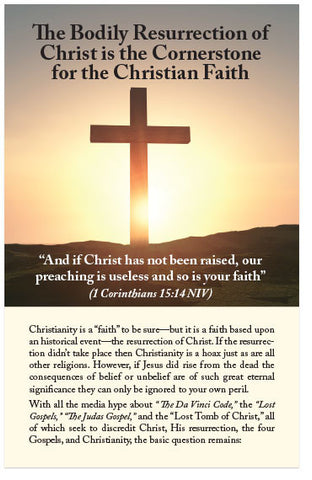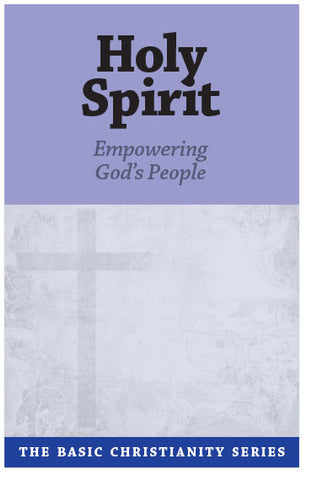What About Those Who Have ... Never Heard! (NASB)
Special-Order Folded Flyer Tract
 NOTE: This item is custom-printed to order (click for more details).
NOTE: This item is custom-printed to order (click for more details).
This tract is from our print-on-demand library, and is not kept in stock. Select the options below, and we will custom-print a batch just for you. Because this item is custom-printed, you can add your custom imprint to the back page at no extra cost.
- Estimated shipping date: Friday, January 30 (Click for more details)
- SKU:
- Discounts: Discount coupons do not apply to this item
- Format: Folded Flyer Tract
- Size: 3.66 x 8.5 inches
- Pages: 6
- Imprinting: Available with 5 lines of custom text
- Version: NASB
- Returns: Because this item is custom-printed to order, it cannot be returned.
Show all item details
The full text of this flyer tract is shown below in the NASB version. (Do you want to print this tract in a different version than the one listed? Contact us and let us know what you're looking for—we may be able to create the alternate version for you at no charge.)
The quintessential question that has plagued the soul of man since the first announcement of the gospel of Jesus Christ is, “What about those who have never heard?” If Jesus Christ is the only means of salvation, of deliverance from sin, and of reconciliation with God, it’s only reasonable to be genuinely concerned for those who have never heard the sound of his atoning name. Is there no hope for them? Is salvation only for those who were privileged, or should we say, lucky enough to be born into a society where the name of Jesus is a matter for common discourse?
Let’s think about the question.
Since no meaningful words, no statement, and no reasonable question exists in a vacuum, this question, like all others, presupposes certain conditions. For example, this question would never be asked in a society where the name of Jesus had never been heard, but only in a society where his name was both common knowledge and sufficiently revered so as to arouse this concern. So, are those who don’t live in such a society facing certain condemnation just because of their “ignorance”? What if they were born in a remote corner of a dense jungle, or on an “undiscovered” island? Is that their fault? Certainly not; but still, it was Jesus himself who said, “I am the way, and the truth, and the life; no one comes to the Father but through me” (John 14:6). So how do we reconcile this apparent conundrum, this troubling moral issue that seemingly condemns the innocent without so much as a glance or nod from God?
To answer this question, it will be necessary to clarify a few issues, the first being the fact that there are no “innocent” persons, for “all have sinned and fall short of the glory of God” (Rom. 3:23). But is that too harsh? Too generalized? No, this statement is an exact representation of the truth of the matter, as Paul explains in Rom. 1:18 and following. Note verse 18, “For the wrath of God is revealed from heaven against all ungodliness and unrighteousness of men…” In this context, “all ungodliness” explicitly refers to all unbelievers everywhere, whether they’ve “heard” or not. How do we know this? Because in the very next verse Paul goes on to say, “because that which is known about God is evident within them; for God made it evident to them.” The idea that “the truth is evident within us” and “God made it evident to us” can only mean that God designed us – all mankind – to be able to determine, individually and corporately, on our own, simply by observing the creation, that there is a God who created us, and that he is deserving of both our admiration and our worship.
How does the creation reveal its maker?
How does “the design” reveal God? If we keep reading, Paul explains: “For since the creation of the world His invisible attributes, His eternal power and divine nature, have been clearly seen, being understood through what has been made, so that they are without excuse.” Do you understand what this is saying? That the “invisible” God may be “clearly seen,” and understood, simply by observing the things that have been made – his creation. The creation is universally present; anyone can see it, no one can miss it, because we are part of it. Even a blind man can observe himself! Therefore, says Paul, we are all, each and every one of us, individually and corporately, without excuse before God because in his mind he has made himself abundantly and unmistakably obvious to us – the creation has a creator! …and he, the Creator, is the judge of such matters, before whom we are without excuse.
So does the Creator owe us a hearing of the gospel?
No. Why not? Think about it. The reason we concern ourselves with the gospel of Christ is that, as indicated above, every man initially faces God as a condemned sinner. Condemnation is a legal term. It means that a person has broken the law, a fact that’s not difficult to establish for all of us. As James said in verse 2:10: “whoever keeps the whole law and yet stumbles in one point, he has become guilty of all.” In a nutshell, that means that if a person is old enough to understand the gospel, he’s already guilty. We know some wonderful people, but no one rises above this standard.
But there’s more to it than just breaking the law. Condemnation implies we have already been tried, found guilty, and sentenced. If this were not true, we would not fear our condemnation. It’s the sentence – “Throw out the worthless slave into the outer darkness; in that place there will be weeping and gnashing of teeth” (Matt. 25:30) – that strikes terror into our hearts. It’s the fact that the sentence has already been pronounced – “he who does not believe has been judged already” (John 3:18b) – that drives us to seek pardon. (We often refer to this as forgiveness, but within the context of a legal proceeding, “pardon” is the more appropriate term.)
But why do we seek pardon (forgiveness)? Because pardon is our only hope. Think again. We’ve been condemned in the court of God, where the only standards are truth and righteousness. So what hope remains? An appeal? On what grounds? Certainly there have been no procedural errors. Could new evidence possibly be offered that might overturn the verdict? No! A pardon (mercy) is our only hope. But how much hope is that? Why would a righteous God offer us a pardon? In all of history, there is no precedent, no standard in any court of law whatsoever, that demands that a court offer a convicted criminal a pardon. There is neither legal compulsion for the judge to offer a pardon, nor legal right by which a convict might demand one. In short, God does not owe us, or anyone – any law breaker – any pardon, ever. If he offers one, fine; but he does not owe us a pardon.
So why would God offer us a pardon?
The only standard for offering a pardon in any system of jurisprudence is the mercy of the judge. So if the judge is God, what would be his motive for mercy, for offering a pardon? Love. If we were to know and understand the divine love, we would find it to be unique to our experience. The divine love is absolute. It cannot be thwarted; it cannot be offended. By way of comparison, when our love is offended, we withdraw it, but God’s love works at a higher level; he never withdraws it, ever. Rather, his love is sacrificial in that, when offended, he chooses to not only accept the offense, but also to initiate the reconciliation. Furthermore, he will do this by whatever means might be required…and as we who have heard the gospel of Christ know, the means required for our reconciliation and pardon were extreme. Nevertheless, this is the nature of the divine being, our Creator. Even under the pressure of violent rejection and extreme duress his love could not, would not, and will not be retracted. Rather, because of the intense nature of his love, it was and is his determined purpose to offer reconciliation and pardon to mankind – to any and all who will listen. (John 3:16-17: “For God so loved the world, that He gave His only begotten Son, that whoever believes in Him shall not perish, but have eternal life. For God did not send the Son into the world to judge the world, but that the world might be saved through Him.”) Please note that while it is God’s determined purpose to provide a means of reconciliation and pardon, pardon is offered, not imposed. The pardon is offered to “whosoever” trusts him. So for each of us, accepting his pardon is a matter of choice; it’s our option, take it or leave it.
So, what about those who have never heard?
That answers the questions of why and how a pardon is offered through the sacrifice of Christ on the cross; but don’t we now sense that the word “whosoever” accentuates the original question even more sharply? If there’s truly a pardon available to all – for whomsoever will accept it – then the question, “what about those who have never heard” becomes even more important for two reasons.
1. First, we really want to know. For that, let’s weigh in the balance several concepts. How intense was the divine love, the divine determination to provide that pardon as a means of universal reconciliation? It was absolute. God not only refused to spare his own innocent son, but he absolutely insisted on sacrificing him on our behalf (Matt. 26:39-42). Jesus Christ eliminated the issue of our sins, the sins of all mankind, whether they had ever heard of him or not. Would God waste such an effort? Would such an intense love make The Way and then turn away as though it was inconsequential – as though he really didn’t care whether some people were ever able to benefit from it or not? No. Let’s go back to our first point of interest, the divine design. We recall that God built into each one of us the ability to look at his creation and know that it was he, the creator (as opposed to created things, idols), who was worthy of worship. Would not, then, God honor such worship with a pardon, even among those who had “never heard,” considering that Christ had, in fact, died for the sins of all, and had, therefore, made the pardon available, even for them? Actually, we don’t know. Paul didn’t go that far with his explanation in Romans 1, perhaps because the overwhelming anecdotal evidence indicates that such an event would be extremely rare…but maybe he had another reason for not addressing this issue.
2. If we answer this question with certainty, then we leave the fate of “those who have never heard” in their own hands. Remember, on the one hand the pardon has been provided and the entire creation bears witness to the exemplary nature of the One True God; therefore our guilt is certain and God is just. But on the other hand we also recall that God does not owe us a pardon, not even a hearing. If the entire creation stands in witness against us, then we are without excuse, just as Paul said. Likewise, we know God is not to blame because we’ve already seen that he has made every provision for the pardon – his love is not only evidenced as perfect, but also as fully expressed! There’s nothing more he could do. However, if we answer this question with uncertainty, it transfers the burden of responsibility for the dissemination of the message to the shoulders of those who have heard because that’s how the gospel message travels; that’s how The Message of The Pardon goes out to the “ends of the earth.” We who have heard sense the terror of eternal condemnation on behalf of those who have not heard and express the love of God we have received in our hearts by deliberately carrying the gospel to them. If we then assume divine guidance to be part of the equation, it’s also reasonable to assume that we will find ourselves in contact with those who seek the One True God of the creation.
Conclusion.
So what about those who have never heard? They face a far more difficult decision than we ever had to. Without the benefit of the gospel, they must focus on the One True God, whom they don’t know, in the face of almost universal temptation toward idolatry. By comparison, our decision was easy…we were offered a clear and sensible gospel. So in the final analysis, I think we’re forced to the conclusion that they are a responsibility we share with God. He’s done his part…the only remaining question is, “Will we?”



